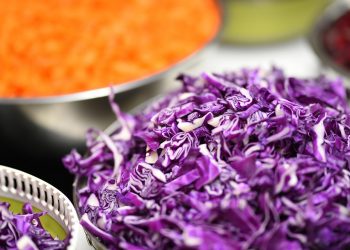Did you know that about 70% of your immune system is housed in your gut? It’s true! A healthy gut can lead to overall better health, and one of the tastiest ways to boost your gut health is by incorporating coconut yogurt into your diet. Not only is it a probiotic powerhouse, but it’s also dairy-free, making it perfect for those who are lactose intolerant or following a vegan lifestyle. So, how can you enjoy this creamy delight while reaping its gut-healing benefits? Let’s dive into five delicious ways to use coconut yogurt for gut healing.
Contents
1. Coconut Yogurt Smoothies
Why Smoothies?
Smoothies are an easy and versatile way to incorporate coconut yogurt into your diet. Blending it with fruits and veggies not only makes a delicious beverage but also enhances its gut-healing properties.
Ingredients to Try:
- Coconut yogurt: Look for brands with live cultures, as these are essential for gut health.
- Leafy greens: Spinach or kale can add nutrients without overpowering the flavor.
- Fruits: Bananas, berries, or mangoes provide natural sweetness and antioxidants.
- Seeds: Flaxseeds or chia seeds offer additional fiber.
How to Make:
- Base: Start with one cup of coconut yogurt.
- Greens: Add a handful of spinach or kale for a nutrient boost.
- Fruit: Toss in a banana and a handful of berries.
- Seeds: Add a tablespoon of chia or flaxseeds.
- Blend: Blend until smooth and enjoy!
Pros and Cons:
- Pros: Quick to make, packed with nutrients, can be customized.
- Cons: If you’re not careful with sugar content (like adding too many fruits), it can get calorie-heavy.
2. Coconut Yogurt Parfaits
The Perfect Breakfast or Snack
Parfaits are not just pretty to look at; they’re also a great way to layer flavors and textures while providing a nutritious start to the day or a healthy snack.
What You Need:
- Coconut yogurt: It’s the star of the show!
- Granola: Opt for low-sugar varieties for added crunch.
- Fruits: Fresh or frozen berries work well.
- Nut butter: A drizzle of almond or peanut butter adds healthy fats.
Layering It Up:
- Base Layer: Start with half a cup of coconut yogurt at the bottom of a glass.
- Granola Layer: Add a layer of granola.
- Fruit Layer: Top with a layer of fruits.
- Repeat: Keep layering until you reach the top!
- Finish: Drizzle with nut butter before digging in.
Pros and Cons:
- Pros: Visually appealing, can be made ahead of time, highly customizable.
- Cons: Granola can be high in sugar, so choose wisely.
3. Coconut Yogurt Salad Dressings
Dress Up Your Greens
Who says salads have to be boring? Adding coconut yogurt to dressings can create a creamy, gut-friendly addition to any salad while boosting flavor.
Basic Dressing Recipe:
- Coconut yogurt: 1/2 cup as the base.
- Vinegar: Apple cider vinegar or lemon juice for acidity.
- Herbs and Spices: Fresh herbs like dill or basil; add garlic powder, salt, and pepper.
- Sweetener: A touch of honey or maple syrup (optional).
How to Mix:
- Combine: In a bowl, mix the coconut yogurt with vinegar or lemon juice.
- Add Herbs: Stir in your choice of herbs and spices.
- Taste and Adjust: Add sweetener if desired, then whisk until smooth.
- Serve: Pour over your favorite salad.
Pros and Cons:
- Pros: A healthier alternative to traditional dressings, easy to make.
- Cons: Some might not enjoy the coconut flavor in a savory dish.
4. Coconut Yogurt as a Substitute in Baking
Baking for Your Gut
Can you bake with coconut yogurt? Absolutely! It works wonderfully as a substitute for sour cream or yogurt in recipes, providing moisture and a probiotic boost.
Baking Tips:
- Use it in Muffins: Replace yogurt in muffin recipes with an equal amount of coconut yogurt.
- Pancakes: Add it to pancake or waffle batter for a fluffier texture.
- Cakes: Substitute half the fat in cake recipes with coconut yogurt for added moisture and less fat.
Personal Experience:
I’ve tried coconut yogurt in blueberry muffins, and honestly, it’s a game-changer. The muffins turned out incredibly moist and fluffy, and I felt good knowing I was sneaking in some gut health benefits!
Pros and Cons:
- Pros: Adds moisture, healthy substitute, can enhance flavors.
- Cons: May alter flavor slightly, so it works best in recipes that complement coconut.
5. Coconut Yogurt with Herbal Infusions
Elevate Your Yogurt Game
Want to spice up your coconut yogurt? Consider infusing it with herbs and spices that are known for their gut-healing properties.
Simple Infusion Ideas:
- Turmeric and Ginger: Both are anti-inflammatory and can boost digestion.
- Mint: Refreshing and soothing for the digestive tract.
- Cinnamon: Adds sweetness and can help with blood sugar regulation.
How to Prepare:
- Choose Your Herbs/Spices: Start with 1-2 teaspoons of your chosen herb or spice.
- Mix: Stir it into one cup of coconut yogurt.
- Let It Sit: Allow it to infuse in the fridge for about an hour.
- Enjoy: Use as a dip, spread, or a side.
Pros and Cons:
- Pros: Easy to make, can tailor to individual taste, boosts health benefits.
- Cons: Some may not enjoy the earthy flavors or may find it unconventional.
FAQs
1. Can coconut yogurt really help improve gut health?
Yes, coconut yogurt contains probiotics that can promote a healthy gut microbiome. Look for brands that specify live cultures for the best benefits.
2. Is coconut yogurt suitable for vegans?
Absolutely! Coconut yogurt is dairy-free and a great option for vegans.
3. How do I choose the best coconut yogurt?
Look for yogurt with minimal additives, no added sugars, and live active cultures. The shorter the ingredient list, the better!
4. Can I eat coconut yogurt if I’m trying to lose weight?
Coconut yogurt can be included in a weight loss diet as long as you pay attention to portion sizes and added ingredients like sugar.
Conclusion
Coconut yogurt is more than just a delicious treat; it’s a versatile ingredient that can help support gut health in various ways. From smoothies and salads to baked goods and infused delights, there’s no shortage of creative ways to add this superfood into your diet. So go ahead and get creative in the kitchen. Your gut (and taste buds) will thank you!
This article is for educational purposes only and is not a substitute for professional medical advice. Always consult a qualified healthcare provider before making changes to your health routine.
References
-
Ghosh, T. S., & Mondal, M. (2021). Probiotics in the management of gastrointestinal disorders. Journal of Clinical Gastroenterology. Retrieved from https://journals.lww.com/jcge/Abstract/2021/01001/Probiotics_in_the_Management_of_Gastrointestinal.9.aspx
-
Mayo Clinic (2022). Probiotics: What they are and how they work. Retrieved from https://www.mayoclinic.org/drugs-supplements-probiotics/art-20308093
-
Harvard Health Publishing (2020). The gut microbiome: What is it, and why is it important? Retrieved from https://www.health.harvard.edu/diseases-and-conditions/the-gut-microbiome-what-is-it-and-why-is-it-important
Get Your FREE Natural Health Guide!
Subscribe now and receive our exclusive ebook packed with natural health tips, practical wellness advice, and easy lifestyle changes — delivered straight to your inbox.















